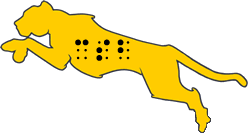Intervener Services for the Deafblind
A student who is deafblind may require unique information-gathering strategies that support their access to motor and concept development, interaction, communication, and learning. This can create challenges for educational systems. Teams often benefit from deafblind-specific support to meet each student's unique learning style. Intervener services can help meet the challenges of providing students with access to communication and information they are unable to gather via vision and hearing. As such, they help provide students who are deafblind with a free and appropriate education in the least restrictive environment possible.
What is an Intervener?
An intervener is a paraeducator who has specialized training in providing one-to-one support for students who are deafblind in the following areas:
- Helping them gain access to information and communication in educational and community settings
- Facilitating their social development and emotional well-being
- Supporting their communication and concept development
An intervener is a member of the student's educational team, working under a classroom teacher's and related service providers direction. In the United States, state deafblind projects and university certificate programs are the primary sources of intervener training. Coaching and supervision, in addition to coursework, are essential.
San Francisco State University offers a 2-semester online university-based program taught by California Deafblind Services staff for intervener candidates:
Intervener Training: Deafblind Education
![]()
Interveners are not necessarily appropriate for every child or youth who is deafblind. As with any related service, Individualized Education Program (IEP) teams review evaluation data to determine a child's needs.
A helpful resource to determine if this service is needed is IEP Team Discussion Guide:
Are Intervener Services Appropriate for Your Student With Deaf-Blindness?
![]() (PDF)
(PDF)
Additionally, the National Center on Deafblindness ![]() has a wealth of additional resources on interveners.
has a wealth of additional resources on interveners.
Learn More
For more information about interveners or intervener training, please contact Kathleen Mortier, PhD, Project Director, California Deafblind Services by email at kmortier@sfsu.edu or Julie Maier, Project Coordinator, California Deafblind Services by email at jmaier@sfsu.edu or by phone at 415-405-7558.
This information is provided as a courtesy by the California Deafblind Services
![]() .
.
Events
- Summer Academies 2026
- Open House 2026
Wednesday, April 22, 2026
- Spring Art Show
Wednesday, May 13, 2026
Thursday, May 14, 2026 - Learning Lab
- Short Courses 2025-2026
- General Tours
 (Google Form)
(Google Form)
Please fill out the Google Form if you are interested in attending any of our General Tour days.


